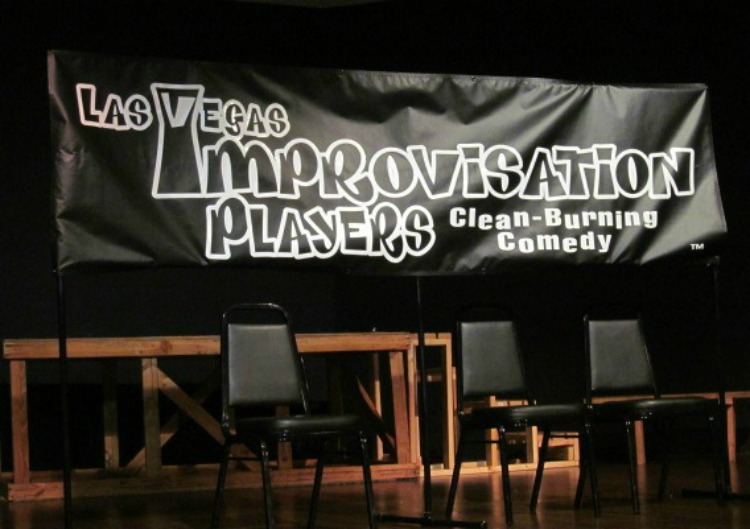4 Rules of Improv That Can Improve Your Life
4 rules of improv that can improve your life! Shakespeare said that "all the world's a stage..." It's true...we are doing improv every day of our lives. Why not use these rules to improve your life!
|
Improv (short for improvisation) is a stage show wherein cast members create and perform music, scenes, and sketches spontaneously. I am the musical director, a board member, and one of the revered players of one of Las Vegas’ longest running Improv Shows, “The Las Vegas Improvisation Players – Clean Burning Comedy.” |
 The Calm before the Perform... |
It is one of my great loves in life.
Contrary to what some might believe, improvisation has rules to follow in order for one to be the best, the funniest, the quickest, etc.
Coincidentally, the 4 main rules of improv can also help you improve your life.
- Don’t Gag.
IMPROV: The hardest lesson I had to learn was not to “gag.” Gagging is what you are doing if you are TRYING to be funny when, in fact, the scene would work better if you just played it straight. Throwing in a punch line ends the scene that could have been more funny than your punch line ever could be.
LIFE: Sometimes people try to be funny at the wrong time. Being funny is fun, and you CAN improve your “being funny” skill. Timing is a great source of comedy AND of life. Learn to be funny at the correct time…and don’t gag. - In each scene (game), develop the CROW (Character, Relationship, Objective, Where).
IMPROV: Some scenes are only 30-60 seconds long. The only way the audience is going to relate to your scene and think it is funny is if you start with a character that already has a certain relationship with another character. The characters should know what the objective of the scene is, and be at a “location” that the audience is familiar with.
LIFE: YOU are the character (yourself). You have relationships in your life (spouses, parents, siblings, relatives, friends, foes, etc.). You have, or should have, an objective in your life (What are your goals? What do you want to be if/when you grow up? What do you plan on doing each day once you get out of bed?). Your location is somewhere, in your heart or in your mind, where you have agreed to be at this time in your life.
If you love who, what, why, and where you are, then you have played your life right…if not, change it! - “Yes, and…”
IMPROV: If someone in the scene says that you are their father, and you deny it and tell them that you’re their little sister, the audience will become disillusioned because you denied the offer that you were given. If you go into the scene thinking that you are going to be the little sister, but the other person endows you as their father, you need to accept it, AND add on to it (example: “Yes, and you are grounded because you wrecked my brand new Ferrari.”).
LIFE: You can be considered a great conversationalist if you use this rule. If someone says to you that it is a nice day and you say something like, “I guess it is,” but nothing else, then you have let an opportunity pass you by. You can add on to the conversation by saying something like, ” Yes, and when the breeze comes wafting through my hair, I feel like I am at the beach.” That sentence, right there, has many options for you and the other person to talk about. So be a “YES, AND-er.” - Don’t ask questions.
IMPROV: Since your scene is only 30-60 seconds long, questions muck up the health and vibrancy of a scene. They slow down the flow and it often throws the other person in the scene under the bus. (Example: Instead of saying “What is that thing you are holding?,” say something like, “That is the ugliest blue and red gila monster I have ever seen.”) Asking questions is almost like denying that you know what is going on. You can’t do that. You must make bold and declarative statements.
LIFE: While “yes,” it is very important in life to ask questions, it is also important to be confident and to appear as if you know what you are doing. In those cases, don’t ask questions…make bold declarative statements. When you do, you will go further in your life than you would have by only asking questions.
Believe it or not, these improv rules are important when you are scenes and life relationships. PLUS, they will also make your life more exciting and animated.
If you want to know more about improv:
- Find a troupe in your area and attend one of their shows.
- Attend an improv workshop if you can find one.
- Watch “Whose Line is it Anyway?” on YouTube (their episodes are usuallyclean)
The troupe I work with is family friendly, but you should know that some improv troupes like to go “blue” (use bad language and/or worldly situations), so do your due diligence if that is a concern to you.
|
If you found the information within these pages helpful or useful, please donate to show your support. |
About the Author
Promotional Materials
Sign up for the
monthly E-Zine,
"The L4 Factor"
Get even more tips and tricks about how to
increase the
"happiness quotient"
in your life!


